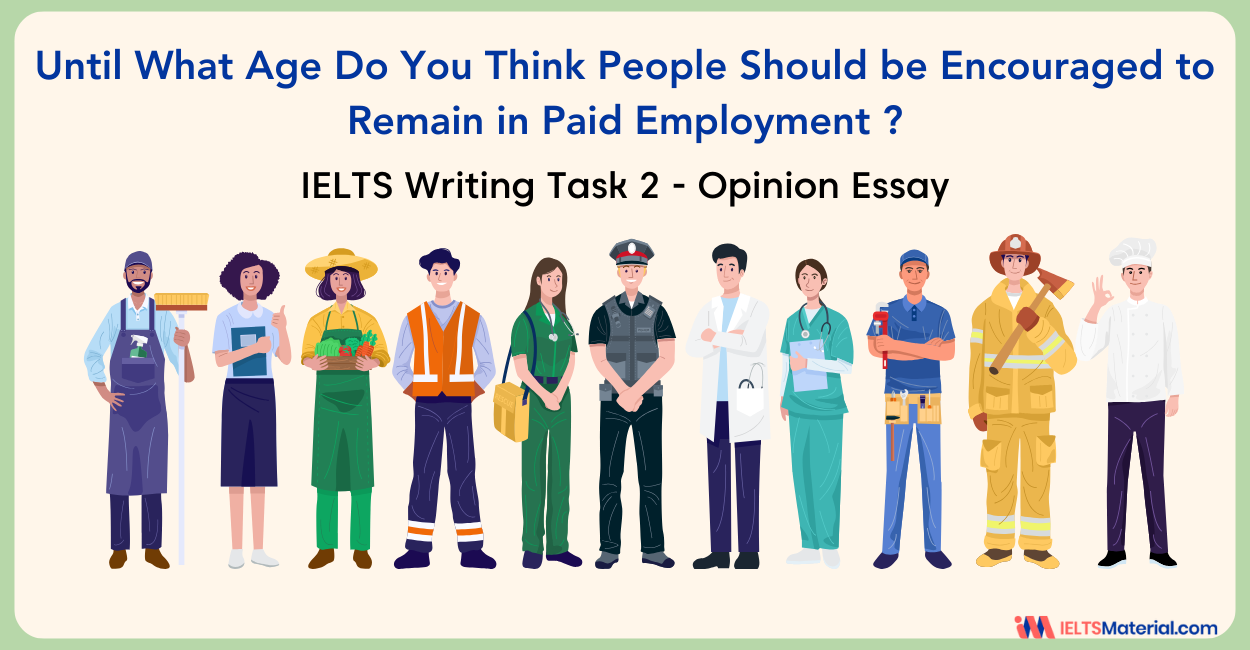IELTS Writing Task 2: Until What Age Do You Think People Should be Encouraged to Remain in Paid Employment?
Table of Contents

Try AI Essay Checker for Instant Band Score
Mastering the Essay Writing section of the IELTS Writing module is a challenge for many IELTS test-takers. Therefore, honing your essay writing skills before attempting the IELTS is crucial for success.
The IELTS Writing Task 2 is a crucial part of both the General Training and Academic versions of the IELTS exam. It assesses your ability to write a well-structured and cohesive essay in response to a given topic.
In this task, you will be presented with an Opinion Essay prompt, with a statement or topic and asked to state your opinion on it. You must then provide supporting arguments to back up your position.
To effectively prepare for the IELTS Writing Task 2, it is highly recommended to practice with a variety of sample essays. IELTSMaterial.com offers a comprehensive collection of IELTS writing task 2 practice tests, that can help you hone your essay writing skills and achieve a high score in the exam.
Question
In some countries the average worker is obliged to retire at the age of 50, while in others people can work until they are 65 or 70. Meanwhile, we see some politicians enjoying power well into their eighties. Clearly, there is little agreement on an appropriate retirement age.Until what age do you think people should be encouraged to remain in paid employment?
Give reasons for your answer and include any relevant examples from your own knowledge or experience.
Structure Breakdown
Essay
Introduction
Body paragraph 1
Body paragraph 2
Conclusion
|
Band 7 Sample Answer
Introduction:
The global debate on retirement age has been ongoing since ancient times, with regulations differing across nations. Some countries, especially those with a large youth workforce, enforce early retirement at 50 to open up job opportunities and bring ideas to the workforce. In contrast, nations dealing with labor shortages permit individuals to work beyond 60, even up to 65 or 70. However, in my view, certain professions, like politics, have no age limit because of the crucial need for extensive experience, while the military requires retirement by 45 due to the physical demands of the job.
Body Paragraph 1:
Primarily, In countries with a large youth population, early retirement at 50 is common to bring fresh ideas to the workforce. However, many retirees turn to freelance work because early retirement may not fully cover their financial needs. For example, China, with its substantial youth and overall population, officially limits citizens from working beyond the age of 50.
Body Paragraph 2:
In contrast, nations like Poland and Iceland extend the retirement age to 70, grappling with low workforce levels and an aging population. This approach, though affecting productivity, is supported by many as it enables individuals to accumulate sufficient resources for a happy and independent life. Austria, confronted with a high percentage of senior citizens, allows people to work until 70 and has implemented a skilled migration scheme to address workforce shortages.
Conclusion:
To conclude, deciding the retirement age demands careful evaluation of a country’s job market, population trends, and other societal influences. While professions like politics should not have age limits, occupations with specialized skill sets, such as the military, may require unique retirement age considerations. Therefore, a flexible and thoughtful approach is vital to balance the needs of the workforce and individual well-being.
Band 7 Vocabulary
- Ongoing:
Meaning: Continuing or in progress.
Example: The ongoing debate about retirement age spans centuries and involves various perspectives.
- Regulations:
Meaning: Official rules or laws.
Example: Retirement age regulations differ across nations, shaping their workforce dynamics.
- Infuse:
Meaning: To introduce or inject.
Example: Early retirement aims to infuse new energy and innovative ideas into the workforce.
- Crucial:
Meaning: Extremely important or necessary.
Example: Extensive experience is crucial in professions like politics, where age limits may not apply.
- Differing:
Meaning: Varying or being different.
Example: The retirement age is differing across nations due to their unique economic and demographic situations.
- Permit:
Meaning: Allow or authorize.
Example: Nations dealing with labor shortages permit individuals to work beyond 60.
- Grappling:
Meaning: Struggling or dealing with.
Example: Countries like Poland and Iceland are grappling with low workforce levels and an aging population.
- Accumulate:
Meaning: To gather or collect over time.
Example: Extending the retirement age allows individuals to accumulate sufficient resources for a happy and independent life.
- Implemented:
Meaning: Put into effect or action.
Example: Austria has implemented a skilled migration scheme to address workforce shortages.
- Perspectives:
Meaning: Different views or ways of looking at things.
Example: The essay presents various perspectives on retirement age, considering factors like job market and societal influences.
Band 8 Sample Answer
Introduction:
In certain nations, the typical worker is required to retire at 50, whereas in other places, individuals can continue working until the ages of 65 or 70. Concurrently, some politicians retain their positions well into their eighties. Evidently, there is a lack of consensus on what constitutes an appropriate retirement age. However, in my opinion, supporting an increase in the retirement age brings benefits to both individual employees and employers, encouraging valuable contributions to the workforce and offering economic advantages to organizations.
Body Paragraph 1:
To begin with, a worker’s capability should not be solely determined by their age, as many individuals at the age of 65 continue to perform exceptionally well, thereby challenging the notion that age necessarily impedes productivity. Rather than relying on set age limits, employers should assess workers based on their performance. This way, organizations can keep experienced and skilled employees, saving on the costs of hiring and training new staff. This approach ensures that those unaffected by age-related decline continue to contribute valuable skills to the workforce.
Body Paragraph 2:
Nevertheless, with the global increase in life expectancy, it is essential to reconsider the traditional retirement age. Extended lifespans offer individuals the opportunity to make ongoing meaningful contributions in the workforce. Mandatory retirement ages, like 55, are harder to justify when people statistically live longer. This is especially important with aging populations, where governments struggle to financially support seniors. Allowing capable workers to stay employed for as long as possible reduces the strain on public spending and benefits from the expertise of experienced professionals.
Conclusion:
In conclusion, evaluating workers based on performance rather than age is a sensible approach to managing the workforce. Extending the retirement age benefits individuals who can continue contributing meaningfully and is economically advantageous for organizations and governments. By reconsidering policies that mandate early retirement, societies can adapt to the demographic shift toward longer life expectancies and tap into the potential of a more experienced and capable workforce.
Band 8 Vocabulary
- Consensus:
Meaning: General agreement or unity of opinion.
Example: There is a lack of consensus on what age is considered appropriate for retirement.
- Evidently:
Meaning: Clearly; plainly; obviously.
Example: Evidently, the diverse retirement ages across nations highlight the lack of a unified approach.
- Capability:
Meaning: The ability or capacity to do something.
Example: A worker’s capability should be assessed based on performance rather than age.
- Impedes:
Meaning: Hinders or obstructs progress.
Example: The essay challenges the notion that age necessarily impedes productivity.
- Mandatory:
Meaning: Required by law or rules; obligatory.
Example: Mandatory retirement ages, like 55, are becoming harder to justify with longer lifespans.
- Decline:
Meaning: A gradual deterioration or decrease.
Example: The approach ensures that those unaffected by age-related decline continue to contribute valuable skills.
- Concurrently:
Meaning: Happening at the same time; simultaneously.
Example: Some politicians retain their positions well into their eighties, concurrently raising questions about retirement norms.
- Sensible:
Meaning: Practical and reasonable; showing good judgment.
Example: Evaluating workers based on performance rather than age is a sensible approach.
- Adapt:
Meaning: Adjust or modify to suit a new situation or environment.
Example: Societies need to adapt to the demographic shift toward longer life expectancies.
- Tap into:
Meaning: To make use of or take advantage of a resource.
Example: By reconsidering retirement policies, societies can tap into the potential of a more experienced workforce.
Practice & Prepare with IELTS Writing Task 2 Sample Questions and Answers
Band 9 Sample Answer
Unlock Explanations
If you want to have a look at the band 9 sample answer, sign up!
Introduction:
In today’s dynamic world, the determination of an appropriate retirement age has become a subject of ongoing discussion. While some countries mandate retirement at 50, others permit continued employment until 65 or even 70. This inconsistency raises the question of the ideal age for individuals to step away from paid work. From my perspective, it is crucial to adopt a flexible approach that takes into account the variety of professions, individual capabilities, and societal requirements in order to determine the optimal retirement age.
Body Paragraph 1:
The physical demands of various professions are crucial in establishing an appropriate retirement age. Physically demanding jobs such as construction or manufacturing may necessitate an earlier retirement age to protect workers’ well-being. For instance, prolonged physical exertion in these fields may lead to increased health risks as individuals age. Mandatory retirement at an earlier age in such professions ensures that workers leave before their physical capabilities decline to a point where their health is jeopardized.
Body Paragraph 2:
On the other hand, knowledge-based professions often see individuals maintaining peak performance well into their later years. Studies suggest that mental acuity can persist and even improve with age. In academic, research, and consultancy fields, the wealth of experience accumulated over decades can be a valuable asset. For instance, encouraging a flexible retirement age based on individuals’ cognitive abilities and expertise enables professionals to contribute meaningfully to their fields.
Conclusion:
In conclusion, deciding the right retirement age requires a flexible approach, considering different professions, individual abilities, and societal needs. I believe that creating strategies that account for the physical and cognitive demands of various jobs, while implementing gradual transition policies, can achieve a balance for worker well-being, sustainable pension systems, and ongoing contributions from experienced individuals. Essentially, flexibility is crucial in navigating the complexities of determining the ideal retirement age.
Band 9 Vocabulary:
- Dynamic:
Meaning: Characterized by constant change, activity, or progress.
Example: The business world is dynamic, with new technologies and trends emerging regularly.
- Inconsistency:
Meaning: Lack of uniformity or steadiness; the state of being unpredictable.
Example: The inconsistency in weather patterns has made it challenging to plan outdoor events.
- Optimal:
Meaning: Most favorable or advantageous; the best possible.
Example: A well-balanced diet is crucial for optimal health and well-being.
- Well-being:
Meaning: The state of being comfortable, healthy, or happy.
Example: Regular exercise contributes to overall well-being and fitness.
- Mandatory:
Meaning: Required by law or rules; obligatory.
Example: Wearing a seatbelt is mandatory for drivers in many countries.
- Acuity:
Meaning: Sharpness or keenness, especially in thought, vision, or hearing.
Example: The detective’s mental acuity allowed him to solve complex cases quickly.
- Consultancy:
Meaning: The practice of giving professional advice within a specific field.
Example: The company hired a consultancy firm to improve its marketing strategies.
- Accumulate:
Meaning: To gather or collect over time.
Example: Savings accumulate interest when left in a bank account.
- Jeopardize:
Meaning: To put at risk or endanger.
Example: Failing to address safety concerns can jeopardize the success of a project.
- Navigating:
Meaning: To find one’s way through a challenging or complex situation.
Example: Successfully navigating the competitive job market requires a combination of skills and networking.
Connectors Used in the Above Sample Answers
Connectors, also known as connectives or transition words, are words or phrases that link ideas or parts of a sentence or paragraph together. Here are some of the connectors used in the above sample answers:
- While
- In order to
- Nevertheless
- To begin with
- Rather than
- On the other hand
- For instance
- In conclusion
- By reconsidering
- Essentially
Sign up for an IELTS Expert Session today and uncover valuable tips for producing a high-scoring IELTS Writing Task 2 essay! Limited spots available, so don’t miss out!”
More Writing Task 2 Topics:
Practice IELTS Writing Task 1 based on report types

Start Preparing for IELTS: Get Your 10-Day Study Plan Today!
Recent Articles

Nehasri Ravishenbagam

Nehasri Ravishenbagam

Kasturika Samanta





Post your Comments